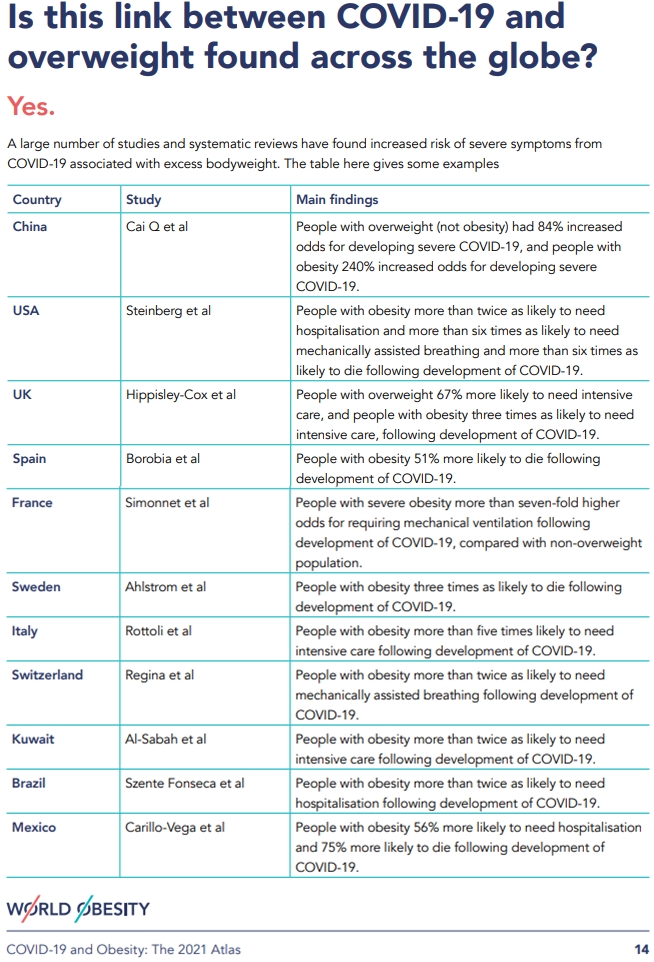New study from World Obesity Federation found that 2.2 million of 2.5 million COVID-19 deaths occurred in countries with high levels of obesity

Since coronavirus began over a year ago in Wuhan, China, researchers have warned that there is a direct correlation between obesity and higher COVID-19 death tolls across the globe. Obesity and overweight are also linked to hypertension and an increased risk for heart failure. According to CDC, about 655,000 Americans die from heart disease each year—that’s one in every four deaths, this means heart disease kills 25% of Americans each year.
Health experts have known for many years that obesity increases the likelihood of developing a wide range of non-communicable diseases. However, less well-known is the fact that obesity also increases the likelihood that infectious diseases will lead to serious consequences. The new study shed more light on the correlation between obesity and “the global spread of the SARS-CoV-2 virus and the resulting pandemic of COVID-19.”
Now, a new report from the World Obesity Federation (WOF) confirmed what researchers and health experts have been saying for over a year put to rest any doubt about the linkage between obesity and coronavirus. The organization also states equivocally that overweight is associated with the severity of COVID-19 and the need for hospital treatment.
As part of the study, the World Obesity Federation examined almost 100 countries and found that 2.2 million of 2.5 million deaths reported by the end of February 2021 occurred in countries with high levels of obesity. Overall, this means that 90% of the total death rates were found to be 10 times higher in countries where more than half the population was overweight.
Below is how the World Obesity Federation explains its findings:
“This report shows that in countries where less than half the adult population is classified as overweight*, the likelihood of death from COVID-19 is a small fraction – around one-tenth – of the level seen in countries where more than half the population is classified as overweight. Of the 2.5 million COVID-19 deaths reported by the end of February 2021, 2.2 million were in countries where more than half the population is classified as overweight.”
Simply put, it means that not a single country with low levels of obesity had a coronavirus death rate higher than 10 per 100,000 population. And no country with death rates above 100 per 100,000 had less than 50% of its population overweight.
World Obesity Federation said these figures are by “necessity incomplete, and that a clearer picture may emerge as the pandemic develops further. The figures are affected by the ability of a country to control its borders and by the speed with which the virus and its variants spread through populations and into more remote areas.”
The organization said that the patterns of the disease will change as some counties vaccinate their populations more rapidly than others. “Nonetheless, our findings have serious public health implications,” World Obesity Federation said.
Commenting on the report, Dr. Tim Lobstein, the author of the report and visiting professor at the University of Sydney, said, “We now know that an overweight population is the next pandemic waiting to happen.” Dr. Tim is a senior policy adviser to the World Obesity Federation.
The WHO has said the “correlation between obesity and coronavirus mortality rates is clear.” The organization further noted that COVID-19 is not the first respiratory viral infection exacerbated by overweight.
“Data from the last two decades on the impact of MERS, H1N1 influenza and other influenza-related infections show worse outcomes linked to excess bodyweight. An overweight population is an unhealthy population, and a pandemic waiting to happen. “
Meanwhile, the latest report confirms a previous study conducted in August 2020. In a paper published in Obesity Reviews, an international team of researchers pooled data from scores of peer-reviewed papers capturing 399,000 patients. They found that people with obesity who contracted the coronavirus were 113% more likely than people of healthy weight to land in the hospital, 74% more likely to be admitted to an ICU, and 48% more likely to die.
Surprisingly, the World Obesity Federation said it is “unlikely” that there is a correlation between population overweight and COVID-19 mortality due to a higher proportion of older people being found in countries where overweight is more common.
“While older age is certainly a risk factor for COVID-19 disease severity and is considered a greater risk than overweight, it does not explain the association between population overweight and COVID-19 mortality.”
Below is a table from the study that shows the linkage between COVID-19 and overweight across the globe.

So, what is the takeaway from this report? One could infer from the report that 90% or 2.2 million of the 2.5 million COVID-19 deaths could have been prevented if people are living healthy lifestyles.

